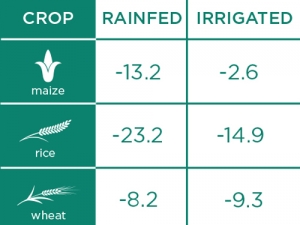Green no more?
OPINION: Your old mate has long dismissed the Greens as wooden bicycle enthusiasts with their heads in the clouds, but it looks like the ‘new Greens’ may actually be hard-nosed pragmatists when it comes to following voters.
 Effect of climate change on average maize, rice and wheat yields in 2050: Based on process-based models (DSSAT) between 2010 and 2050 (%). Source: IFPRI study
Effect of climate change on average maize, rice and wheat yields in 2050: Based on process-based models (DSSAT) between 2010 and 2050 (%). Source: IFPRI study
This year will likely be the hottest on record, according to the World Meteorological Organisation.
Depending on whether you are planning a beach holiday, or trying to keep your grass green, it could be a mixed blessing.
As temperatures continue to rise and extreme weather events such as droughts and floods become more frequent, worldwide farmers face more unpredictable and difficult growing conditions. Now, more than ever, global farmers need plant science technology to help combat climate change.
According to the International Food Policy Research Institute (IFPRI) rice, wheat and maize yields will fall significantly over the next 50 years without the aid of technology including crop protection and biotech traits to tackle climate change (see table).
Drastically reduced crop yields could have a devastating impact on global food security and that's where the plant science industry can help. Here are four technologies that are assisting farmers in many countries mitigate and adapt to climate change:
Heat-Tolerant Traits: The University of Florida has developed heat-tolerant biotech traits that showed yield increases of 38% in wheat, 23% in rice and 68% in maize grown in extreme and unexpected hot conditions.
Drought-Tolerance: For example the Water-Efficient Maize for Africa project is developing biotech traits that maintain and double maize yields in drought conditions.
Crop Protection Products: Climate change is pushing pests and diseases into new geographic areas. Crop protection products help farmers increase their yields despite the evolving threat and unanticipated changes in pest populations.
Nitrogen-Use Efficiency (NUE): Nitrogen fertiliser run-off can find its way into surrounding land and water. NUE traits will enable farmers to apply less nitrogen fertiliser without sacrificing yields.
While farmers worldwide will be challenged with climate change, smallholder farmers in developing countries could be hit the hardest – according to Agriculture for Impact, hunger and child malnutrition in Africa could increase by as much as 20% by 2050 as a result of climate change.
If the global community is to meet the United Nations' ambitious goal to end world hunger by 2030, while also facing up to the challenge of climate change, it will need these plant science tools at its disposal.
· Mark Ross is chief executive of Agcarm, New Zealand's industry association for companies which manufacture and distribute crop protection and animal health products.
Following a side-by-side rolling into a gully, Safer Farms has issued a new Safety Alert.
Coming in at a year-end total at 3088 units, a rise of around 10% over the 2806 total for 2024, the signs are that the New Zealand farm machinery industry is turning the corner after a difficult couple of years.
New Zealand's animal health industry has a new tool addressing a long-standing sustainability issue.
The Government has announced that ACC will be a sponsor of this year's FMG Young Farmer of the Year competition.
As veterinary student numbers grow to help address New Zealand's national workforce shortge, Massey University's School of Veterinary Science is inviting more veterinary practices to partner in training the next generation of vets.
South Island dairy farmers will soon be able to supply organic milk to Fonterra.